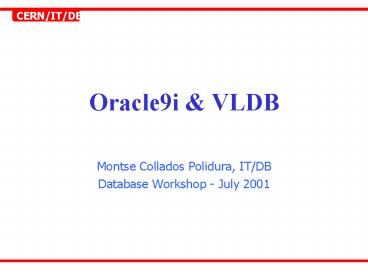Oracle9i - PowerPoint PPT Presentation
Title:
Oracle9i
Description:
SUBPARTITION BY HASH(event_id) SUBPARTITIONS 4. PARTITION event_100000 VALUES LESS THAN(100000) ... SUBPARTITION event_100000_3 TABLESPACE data3, SUBPARTITION ... – PowerPoint PPT presentation
Number of Views:27
Avg rating:3.0/5.0
Title: Oracle9i
1
Oracle9i VLDB
- Montse Collados Polidura, IT/DB
- Database Workshop - July 2001
2
VLDB - Features
- Partitioning
- Materialized Views
- Parallelism
3
PARTITIONINGDIVIDE AND CONQUER
- Tables and indexes decomposed into smaller and
more manageable pieces called partitions. - Same logical attributes, different physical
attributes - Advantages
- Data management operations at the partition
data loads, index creation, backup/recovery, etc. - Improves query performance (partition pruning)
- Possibility of concurrent maintenance operations
on different partitions of the same table/index. - Partitioning can be implemented without requiring
any modifications to your applications.
4
Operations on partitions
- Add a partition to an existing table
- Split an existing partition into two partitions
- Drop a partition
- Load data into one table partition
- Export data from one table partition
- Import a table partition
- Move a table partition - move it to another
tablespace - Rename a partition
- Truncate a table partition
- Rebuild an index partition
- Modify a partition - change the physical
attributes of a partition
5
How does it work?
Partitioned Table
Select column1, column2 from Table where key
DEC2001
6
Types of Partitioning
List
Hash
Range
7
Range Partitioning
CREATE TABLE event_data (event_id NUMBER(10),
event_data BLOB) PARTITION BY RANGE(event_id)
( PARTITION event_100000 VALUES LESS THAN(100000)
TABLESPACE tsa, PARTITION event_200000 VALUES
LESS THAN(200000) TABLESPACE tsb, PARTITION
event_300000 VALUES LESS THAN(300000) TABLESPACE
tsc)
8
Hash Partitioning
- CREATE TABLE event_data
- (event_id NUMBER(10),
- event_data BLOB)
- PARTITION BY HASH(event_id)
- PARTITIONS 4
- STORE IN (data1, data2, data3, data4)
9
List Partitioning
CREATE TABLE sales_list (salesman_id NUMBER(5),
salesman_name VARCHAR2(30), sales_state VARCHAR2
(20), sales_amount NUMBER(10),
sales_date DATE) PARTITION BY
LIST(sales_state) ( PARTITION sales_west VALUES
IN('California', 'Hawaii'), PARTITION sales_east
VALUES IN ('New York', 'Virginia',
'Florida'), PARTITION sales_central VALUES
IN('Texas', 'Illinois'), )
10
Composite Partitioning
CREATE TABLE event_data (event_id NUMBER(10),
event_data BLOB) PARTITION BY RANGE(event_id)
SUBPARTITION BY HASH(event_id) SUBPARTITIONS
4 PARTITION event_100000 VALUES LESS
THAN(100000) ( SUBPARTITION event_100000_1
TABLESPACE data1, SUBPARTITION event_100000_2
TABLESPACE data2, SUBPARTITION event_100000_3
TABLESPACE data3, SUBPARTITION event_100000_4
TABLESPACE data4), PARTITION event_200000 VALUES
LESS THAN(200000), ( SUBPARTITION event_200000_1
TABLESPACE data1, SUBPARTITION event_200000_2
TABLESPACE data2, SUBPARTITION event_200000_3
TABLESPACE data3, SUBPARTITION event_200000_4
TABLESPACE data4)
11
Partitioned Indexes
- Local indexes, automatically linked to a tables
partitioning method. - Global indexes, partitioned independently.
12
Materialized Views
- Materialized views, also called snapshots, are
schema objects that can be used to summarize,
precompute, replicate, and distribute data. - Refreshed upon committing, on a recurring timed
basis, or on demand. - Summary table Query Rewrite mechanism.
- Materialized views for distributed computing
13
Parallelism
- Server processes that perform parallel
operations. - Degree of Parallelism (DOP) configured at
database startup (PARALLEL_MIN_SERVERS,
PARALLEL_MAX_SERVERS) and at the SQL statement
level.
14
Parallelism
- Parallel execution improves processing
- Queries requiring large table scans and joins
- Creation of large indexes
- Partitioned index scans
- Bulk inserts, updates, and deletes
- Hardware considerations
15
Conclusions
- Divide Conquer to gain performance and
manageability. - Materialized Views to precompute and distribute
data. - Parallel Execution to run faster.

